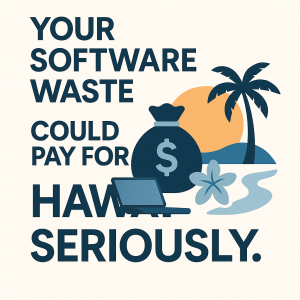September 15, 2025
Cyber Hygiene for Kansas City AEC Firms: Why Getting the Basics Right Protects Your Projects and Your Reputation
When you walk a Kansas City jobsite, you don’t skip the basics. Hard hats, safety vests, and fall protection are non-negotiables. Yet when it comes to protecting your firm’s digital assets, too many AEC businesses still leave the basics undone.
That’s where cyber hygiene comes in. Think of it as the IT version of washing your hands after a long day in the field. It’s not flashy. It won’t win design awards. But without it, you’re exposing your firm to costly breaches, downtime, and compliance failures that can derail your projects and your reputation.
According to IBM’s 2023 Cost of a Data Breach Report, 82% of breaches involved data stored in the cloud. The same environment where Kansas City AEC firms increasingly house their Revit models, Procore data, and Bluebeam workflows. The good news? Most of those breaches could have been prevented with foundational safeguards.
Let’s break down what strong cyber hygiene looks like for AEC firms in the KC region and why it matters now more than ever.
Why Cyber Hygiene Matters in Kansas City’s AEC Market
Kansas City isn’t just another metro on the map. Our region has become a hub for industrial development, hyperscale data centers, and complex infrastructure projects like “Project Kestrel” near KCI. That growth brings more opportunity but also more risk.
AEC firms here are collaborating across dozens of subs and vendors, moving massive BIM models between office, jobsite trailers, and cloud storage. Every additional partner, file sync, and mobile device is another opening for cybercriminals.
And let’s not forget compliance. Many local engineers, architects, and contractors are now bidding on federal and defense-adjacent projects. That means CMMC 2.0 and NIST 800-171 compliance aren’t optional. They are the ticket to bid. Weak cyber hygiene isn’t just a security issue. It could cost your firm the chance to compete.
Four Cyber Hygiene Essentials for AEC Firms
1. Secure Your Network Like You Secure a Jobsite
Think of your network as the perimeter fence around a construction site. If it’s full of holes, anyone can walk in. At a minimum:
-
Encrypt sensitive data.
-
Use a firewall.
-
Lock down Wi-Fi with hidden SSIDs and strong passwords.
-
Require remote workers to connect via VPN.
For Kansas City AEC firms, network security takes on extra urgency because field connectivity is now mission-critical. Job trailers rely on LTE/5G kits, Starlink backups, and mobile hotspots. If your network isn’t hardened, one breach could halt a concrete pour or inspection.
2. Train Your Team Because People Are the Weakest Link
Even the most advanced firewall can’t stop an employee from clicking on a phishing email. That’s why employee training is non-negotiable.
Cover the basics:
-
Strong passwords and MFA.
-
Spotting phishing attempts.
-
Safe internet use.
-
Clear policies for handling sensitive data.
Here in KC, where many AEC firms are midsized with lean IT teams, your people are your first defense. Train supers, PMs, and designers to recognize red flags so they don’t become the reason your firm hits the news for a breach.
3. Back Up Your Data Like Your Business Depends on It Because It Does
Every AEC leader in Kansas City knows downtime is expensive. If ransomware locks your files or a server crashes, can your firm keep working?
Backups should cover:
-
Documents and spreadsheets
-
Financials and HR files
-
BIM models and Procore/Bluebeam databases
Best practice: automated backups stored offsite or in the cloud. For AEC firms, that means making sure those 1–10 GB Revit models and point clouds are recoverable without days of lost work.
Immutable backups, copies that can’t be altered or deleted, are becoming the new gold standard. They’re also increasingly a requirement for **cyber insurance and federal contracts.
4. Limit Access Like You Control Site Credentials
Would you let every subcontractor have a master key to your jobsite? Of course not. The same principle applies to your digital systems.
-
Staff should only access the data they need.
-
No single employee should control all systems.
-
Admin rights should be reserved for trusted IT staff.
-
Former employees must be immediately removed from systems.
For Kansas City firms juggling multiple projects and subs, least-privilege access prevents an internal mistake or a malicious actor from spiraling into a full breach.
The Cost of Getting Cyber Hygiene Wrong
Skipping cyber hygiene is a gamble AEC firms can’t afford. The average data breach now costs $4.45 million globally, not counting the reputational hit or lost contracts. For midsized firms in Kansas City, that’s not survivable.
And let’s be honest: downtime in AEC isn’t just about money. When your Procore workflows stall or your BIM models crash, you’re looking at:
-
Delayed inspections
-
Halted pours
-
Missed deadlines
-
Lost confidence from owners and GCs
For firms chasing federal bids, even a minor breach can trigger reporting obligations under Missouri law or **CMMC audits that you fail on the spot.
Why Now? Local Pressures Raising the Stakes
Kansas City’s AEC landscape is shifting fast:
-
Industrial and logistics growth is pushing projects at record speed.
-
Hyperscale data centers are redefining utilities and civil engineering demands.
-
Federal and DoD-adjacent contracts are introducing compliance complexity.
That means firms that ignore cyber hygiene now risk falling behind. Not just in tech, but in business competitiveness.
Your competitors are tightening up their cyber practices, passing compliance audits, and marketing themselves as “tech-forward.” If you’re still running on outdated policies, you’re telling owners and primes that you’re a liability.
Cyber Hygiene in Action: What KC AEC Firms Need
Here’s what “good” looks like for local AEC firms:
-
BIM-Ready IT: Workstations optimized for Revit/Civil 3D with GPUs and fast access to shared models.
-
Field-First Security: VPNs and MFA that don’t slow down jobsite crews.
-
Backup Resilience: 3-2-1 strategies with immutable tiers.
-
Compliance Readiness: CMMC roadmaps, gap assessments, and SPRS scoring.
-
Vendor Accountability: One MSP who manages Autodesk, Procore, Bluebeam, Microsoft 365, and your plotters.
The bottom line? AEC firms need IT that “just works” across office, cloud, and jobsite with cybersecurity built in, not bolted on.
Taking the First Step: Cyber Hygiene Assessment
The truth is, most firms don’t know where their vulnerabilities are until something breaks. That’s why a Cybersecurity Risk Assessment is the smartest starting point.
In less than a week, you can uncover:
-
Gaps in your defenses
-
Hidden risks in your workflows
-
Compliance red flags
-
Actionable fixes tailored to your firm
It’s like a pre-pour inspection for your IT stack. Better to find the cracks now than after the concrete sets.
Final Word: Cyber Hygiene Is KC’s New Competitive Edge
AEC leaders in Kansas City are under more pressure than ever. Tight deadlines, bigger models, and tougher compliance rules mean that weak IT hygiene isn’t just a nuisance. It’s a dealbreaker.
The firms that will win in this next cycle are the ones who treat cyber hygiene like PPE. Non-negotiable, built into the culture, and never skipped for convenience.
Here’s the plain truth: if you wouldn’t send your crew onto a jobsite without hard hats, don’t send your firm into 2025 without cyber hygiene.
Your projects, your people, and your reputation depend on it.
👉 Ready to see how your firm stacks up? Schedule your free Cybersecurity Risk Assessment today. It’s the simplest way to protect your business and prove to owners, primes, and federal partners that your IT foundation is as strong as your build.



